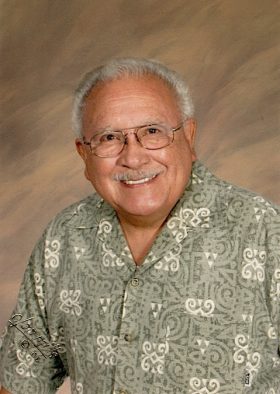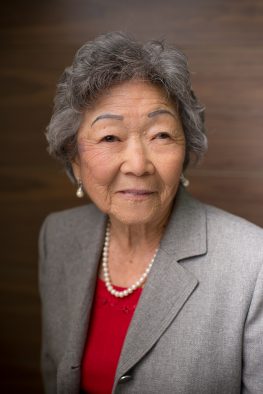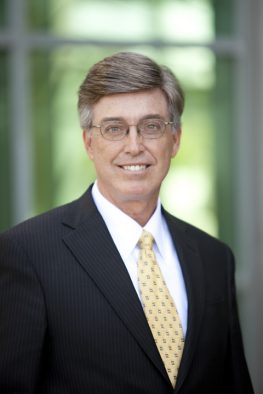The University of Utah Board of Trustees today announced that Robert “Archie” Archuleta, May Farr and Gary L. Crocker will receive honorary doctoral degrees during the 2019 annual commencement ceremony, set for Thursday, May 2, at 6 p.m. in the Jon M. Huntsman Center. The award is the highest honor given by the university.
This year’s recipients exemplify how passionate activism, public advocacy and philanthropy changes lives.
“Our honorees have touched the lives of thousands of people through their commitment to public service,” said Joe Sargetakis, chair of the Board of Trustees’ honors committee. “They also have been unwavering in their support of the university, helping the U in its mission to serve the state as the University for Utah.”
The degree will be awarded posthumously to Archuleta, who passed away unexpectedly in January. He was 88.
Honorary degrees are awarded to individuals who have achieved distinction in academic pursuits, the arts, professions, business, government, civic affairs or in service to the university. The Honorary Degree Committee, which includes representatives from the faculty, student body and Board of Trustees, reviews nominations and then consults with an advisory group of faculty, staff and administrators for additional input. Finalists are presented to the university president, who selects recipients.
Here is background on this year’s honorees.
Robert “Archie” Archuleta, a U alum, was a retired elementary school teacher and principal, former administrative assistant for minority affairs for Salt Lake City, and Latino activist and civil rights advocate. At the time of his death, he was past president of the Board of Trustees for Utah Coalition of La Raza. Archuleta served as president of the coalition for nine years, retiring from that position in 2010.
From 1953 to 1987, he taught grades four, five and six in the Salt Lake City School District. He laid the foundation for the alternative high school that later became Horizonte.
He also was an adjunct professor of sociology at Salt Lake Community College. Archuleta continued to lecture on Mexican American history and racism, sexism, ethnocentrism and civil rights after his retirement from the district.

Robert “Archie” Archuleta
Archuleta served as the administrative assistant for minority affairs in the administration of former Salt Lake City Mayor Rocky Anderson.
Throughout his life, Archuleta was an ardent activist on behalf of minority, poverty, peace, economic, civil rights, civil liberties and cultural issues. In the words of his family, he was “tireless in his quest for justice.”
Archuleta served on numerous community committees and boards, including Centro Civico Mexicano, the Center for Documentary Arts, Salt Lake County Democratic Caucus, Concerned Citizens Committee, Alliance for Unity, Utah Aging Commission, Crossroads Urban Center, Utah Humanities Council and the Enriching Utah Coalition.
He also mentored many students at the U, helping them to develop their own voices as advocates and activists, and served on the U’s Diversity Community Council.
Archuleta received numerous awards and recognitions for his advocacy during his lifetime, including the Albert Fritz Civil Rights Award from the Salt Lake City branch of the NAACP, Quixote Lifetime Achievement Award from the Utah Hispanic Chamber of Commerce, the Cualli Ohtli Award from the Mexican Consulate, the Cesar Chavez Education award from Utah Coalition of La Raza, the Charles E. Bennett Humanitarian and Civil Rights Award from the Utah Education Association, and an honor from the Chicana/o Scholarship Fund at the U.
He and his wife, fellow community activist Lois Lucille Herrmann Archuleta, were honored with a Key to the City from Salt Lake in 2018, and a scholarship has been established at the U in their honor.
Archuleta received his bachelor’s degree from Idaho State University and an education specialist degree from the U (’82). He is survived by his wife of more than 60 years, Lois, five children and six grandchildren.
May Farr has spent her life turning hardships into innovations, roadblocks into pathways and problems into solutions.
Farr and her husband, James, both U alums (B.S.’52 and B.S.’50 B.Ph.’55, respectively), met at Salt Lake County General Hospital, where she was working as a nurse and he was finishing work to become a pharmacist. They moved to California, where they raised their four children while pursuing health careers.
Personal adversity turned the couple into entrepreneurs. In 1963, James Farr suffered a lung infection that required use of awkward and uncomfortable respiratory equipment. There had to be a better option, the couple thought. They invested their life savings to launch Med-Econ Plastics Inc., which manufactured disposable respirator mouthpieces and, later, disposable oxygen masks, tubing and manifold setups.
The Farrs sold the company to C. R. Bard nine years later, but there was more to come. In 1978, they launched a second medical equipment company, Airlife Inc., which they sold to American Hospital Supply Corporation.

May Farr
Throughout this period of innovation and entrepreneurial excellence, the family contended with health challenges. Daughter Ann Marie had a bout with cancer; James was diagnosed with leukemia, which took his life in 1982; and a few years later, son Roger was diagnosed with catatonic schizophrenia. Newly widowed, Farr became a full-time caregiver for her son.
It was this event that led Farr to channel her entrepreneurial spirit into activism. She joined the National Alliance on Mental Illness, helped found a chapter in California’s Inland Valley and eventually was elected to NAMI’s California Board of Directors.
The San Bernardino County Supervisors in 1996 appointed Farr to its Mental Health Commission, a position she still holds today. In 1998, she helped launch the county’s first mental health court.
She has been a stalwart advocate for mental health services and policies, motivated by her own experiences into making meaningful improvements for other families facing similar challenges. Farr pushed for California’s Mental Health Services Act, which realigned tax dollars to provide behavioral and mental health services. As services were reorganized, Farr worked to ensure a state committee representing patients and their family members remained intact.
Farr has received numerous tributes and awards for her advocacy of behavioral health care services, including the California Hospital Association’s Distinguished Service Award, NAMI California’s award for distinguished service to those with serious mental illness, and NAMI’s Richard T. Greer Advocacy Award. She was inducted into the U College of Nursing’s Half Century Society and is a member of the college’s Advisory Council.
The University of Utah and mental health advocacy groups have been recipients of the Farrs’ generosity. In 1972, the Farrs established a Presidential Endowed Chair in Environmental Law at the S.J. Quinney College of Law. After James’ death, the Farr family made a sizeable donation to expand Northridge Hospital Medical Center, which named a new tower in his honor. The U’s School of Medicine and College of Nursing also have received donations from the Farrs.
Gary L. Crocker has reached the pinnacle of medical innovation while keeping grounded in efforts to better the community, support science students and help children in need of therapeutic foster care.
He is president and managing director of Crocker Ventures LLC., a privately held life science investment firm that funds biotechnology and medical device companies. Crocker also currently serves as chairman of the board of both Nexus Orthopedics and publicly traded Merrimack Pharmaceutical, which he joined as a board member in 2005.
Crocker founded Research Medical, a manufacturer and marketer of specialty cardiac catheters and related medical devices used in open heart surgeries. Forbes recognized the business as one of “America’s Best 200 Small Growth Companies” for six consecutive years, and it generated more than 20 percent average annual growth in sales and earnings. After 14 years, Crocker sold the firm in 1997 to Baxter International’s Edwards Life Science division in a $236 million acquisition, hailed at the time as the largest medical device merger in Utah history.

Gary L. Crocker
Prior to launching Research Medical, Crocker was vice president of business development and director of marketing for Sorenson Research; he negotiated the 1980 sale of the firm to Abbott Laboratories. He also served as an internal strategic analyst for Baxter International.
He has held senior leadership positions with several other life science companies, including serving as board chairman for ARUP Laboratories, co-founder and director of Theratech Inc., and as a director of Interleuken Genetics Inc., LineaGen Genetics and The Med-Design Corporation. Crocker also served as a member of the Federal Reserve Branch of San Francisco board from 1999 to 2007. He is a former vice chair of the U’s Board of Trustees, member of University Hospital’s board of directors and director of the University of Utah Research Foundation. He also served as chairman of the U’s College of Science Advisory Board and is an inductee of the College of Science’s Hall of Fame.
Crocker currently serves as the chairman of the U’s Center for Medical Innovation and on the boards of the Sorenson Legacy Foundation and Utah Symphony/Utah Opera. He also has served as chairman of the Utah Youth Village for the past 25 years.
He and his wife, Ann, donated funding in 2001 for the Crocker Science House, which provides housing for science honors students, and a scholarship program for science interns. In 2010, Gary and Ann made the anchor donation for the Crocker Science Center at the U, which opened in April 2018.
The Crockers are recipients of the Utah Philanthropy Day’s Next Generation Spirit of Giving Award. Gary Crocker also was named Utah Entrepreneur of the Year by both Ernst & Young and the MountainWest Capital Network.
He has both a bachelor’s degree (magna cum laude) and an MBA from Harvard University. The Crockers are the parents of seven children.